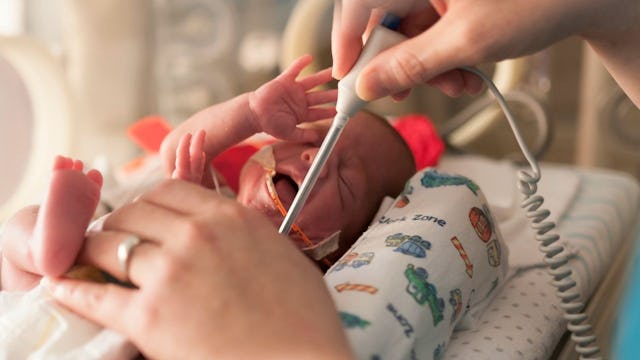How Having A Baby With Medical Complications Changes You

When my son was diagnosed with hydronephrosis in utero, I panicked. I had never heard of hydronephrosis and didn’t realize that kidneys could have fluid on them let alone it lead to long-term health consequences. Medical professionals reassured me that his diagnosis was not reflective of anything that I had done the wrong way it was just something that happened with children from time to time.
When your child is born with health issues, it’s hard not to blame yourself. Any mother whose child has a health condition will tell you we feel some level of responsibility even when it is illogical to do so. You wonder if you would’ve missed one less prenatal vitamin would things have gone differently. Or perhaps that glass of wine you had the week before finding out you were pregnant is what’s the blame. You go through a lot of things that don’t make sense when you say them out loud but you need someone to blame. Most often, you’ll blame yourself.
It took a while, but with time I stopped this feeling the backbreaking level of responsibility. With time, it was predicted that my son’s condition would have little to no impact on his life. But when I found out that my daughter was having health issues including an intrauterine growth restriction and heart complications, every ounce of those feelings of responsibility returned.
Again, I was reassured that it wasn’t anything I had done wrong and for the most part I believed them. But at the same time, there was an aspect of responsibility I just couldn’t shake — the reality of having had a second child with congenital differences.
Having a child with a health condition changes you in a lot of ways. Depending on what that condition is, there might even be an accompanying level of guilt. You might even wonder why you even made the decision to have another child after the first had challenges.
The uncertainty of my children’s future health has forced me to think long-term thinking about if I should ever have more kids. It’s been challenging to do. And nothing makes you think about having children like knowing you might not have a choice in the matter.
I love my children and I see them as absolutely perfect. Instead, I see myself as flawed and the carrier of faulty genes. It hurts me to think that my genes gave my daughter heart issues. It scares me to know that in utero the placenta wasn’t giving her all that she needed. It’s like I was given one evolutionary job and I failed.
I didn’t have any intentions of having more children in the near future. So trying not to get pregnant was a decision I would have to make regardless. But after the anxiety associated with having to go to a specialist and a pending surgery for my daughter, it’s gone from a consideration to a priority.
In full transparency, the health conditions that my children battle are minuscule compared to many of the other children we see when going to Children’s Hospital and seeing specialists. But that doesn’t make their needs any less important. I have to make sure I have the clarity to understand their conditions and maintain their appointments.
A third child could result in more individuals carrying the weight or the financial responsibility of health issues. I say that before referencing my own health issues that have occurred with each pregnancy. Out of the two births I have had, each one has left me with placental tissue and required post-birth surgeries. Having a third child and facing medical neglect a third time could be enough to rob the children I have of their mother. As a black woman, that’s a risk I can’t afford to take.
I know I’m fortunate. I’ve already had two children and there are plenty who haven’t had any. I’m learning to be grateful for the family I have. At the same time, I know the most responsible thing for me to do is think about the future and make decisions that are best for me and the children that I already have before planning for more children. I don’t know if I’ll ever have another pregnancy but at the moment I’m leaning towards not doing so. It’s okay for me to mourn that.
Who knows what the future holds. Perhaps medicine will improve. Or maybe insurance will be easier to come by. But until I have more of those answers I will not be able to answer all of my reproductive questions.
This article was originally published on